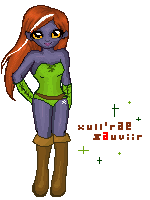While our group largely functions under the Core version 3.5 D&D D20 Rules as written, there are a few variations/deviations of note that we've chosen to utilize. Some (if not most) of the variants were presented in official books such as the DMG and Unearthed Arcana, with the remainder being minor changes of our own that do not significantly impact the system.
In light of the fact that new variants and add-on systems are presented regularly within the D&D gamebooks, this list may change from time to time, though any variant is voted on by the group as a whole before being implemented (or not, as the case may be).
There are even more options and variations I'd personally like to use (actually, I find more each day about the system that I'd like revised), but we've settled on what's below for sake of ease and a desire to not end up with a new system altogether.

Summarized List of Unearthed Arcana Options
- Bloodline Levels
- Class Variants
- Totem Barbarian
- Bardic Sage
- Divine Bard
- Savage Bard
- Cloistered Cleric
- Druidic Avenger
- Thug
- Monk (Variant Fighting Styles)
- Planar Ranger
- Urban Ranger
- Wilderness Rogue
- Battle Sorcerer
- Class Feature Variants
- Favored Environment
- Aspect of Nature
- Spelltouched Feats
- Metamagic Components
- Item Familiars

Psionics
Though I'm loathe to give up the 2nd Edition psionics system that we started the campaign with some years back, for the sake of ease we've decided to go with the version 3.5 rules presented in the Expanded Psionics Handbook.
However, we are using a couple of slight variations. The first thing of note is that we are using the "Psionics are different than Magic" alternate rules presented in the Expanded Psionics Handbook, with the following specific subnotes:
- Dispelling
Dispel Magic has no effect when cast against any psionic power, ability, or item. Likewise, Dispel Psionics is equally useless when manifested against a spell, effect, or magic item.
- Mind-Affecting Spells and Powers
Spells and special abilities that protect the mind against enchantments grant only limited protection against psionic versions of the same effects (as per the Diminished rules). Creatures only gain half their normal resistance. For instance, elves gain a +1 bonus on their Will saving throws to resist telepathy powers.
- Dead Magic/Null Psionic Areas
Antimagic Field does not hinder psionics, nor does Null Psionics Field disrupt or suppress magic within its area. Likewise, Dead Magic and Wild Magic areas do not affect psionics in any way.
Along these lines, note that any psionic ability that is listed as Supernatural is subject to the rule above (making it something of a separate "Supernatural" type).
- Spell Resistance and Power Resistance/Evolution
In a world where psionic powers work but where spell resistance won't protect against a power, powerful creatures must have both spell resistance and power resistance or quickly become extinct. The same can be said of psionic creatures with special protection against mental energies, but none against magic.
Therefore, all creatures listed with Spell Resistance of 10 or higher gain Power Resistance equal to their Spell Resistance minus 10. For example, a dragon with Spell Resistance 18 would also have Power Resistance 8.
Likewise, any creature listed with Power Resistance 10 or higher also gains Spell Resistance equal to their Power Resistance minus 10.
- Specialty Spells and Powers
As with the "evolution" notes above, specialty spells and powers must exist that allow the disparate energies to manipulate each other on a limited scale. For instance, spellcasters could have a Dispel Psionics spell, but it is not nearly as powerful against powers as Dispel Magic is against equivalent spells. Likewise, psions might develop a Negate Magic power along the same lines.
Generally, any spells or powers that allow spells to interact with psionics and vice versa should be of higher level and provide less effect than spells or powers of similar name that remain within their own area of influence.
The second variation of note is that psionic powers have no Display to accompany their manifestation. In previous editions it was known as the Invisible Art; for our purposes, it will remain that way.
This is not to say that using a power that produces energy such as fire, for example, will not have any outward manifestation and display whatsoever. The flames produced by the spell would be very much visibile to anyone. What it does mean is that there is no tell-tale sign that the power itself, in and of its own accord, was being manifested.

Miscellaneous
Open-Ended Rolls
Whenever you roll a 1 on an attack roll, a saving throw, a skill check, or an ability check, roll again and subract 20 from the new result. If you roll a natural 1 on the second roll, roll again and subtract 40, and so on, subracting 20 each time a natural 1 is rolled.
On the other end, any time you roll a natural 20, roll again and add 20 to the result. As with the natural 1, if a natural 20 is rolled on the second roll, you would roll a third time and add 40 to the result, and so on.
A natural 20 on an attack roll still threatens a critical hit as normal, and the confirmation roll is made separately from any additional rolls made to determine the outcome of the initial attack. Likewise, a natural 1 on an attack roll still threatens a critical fumble as normal.
Note that this system replaces the automatic miss and hit chances respectively.
Ability Score Increase Notes
The rules stated in the PHB for ability score increases work as normal, save for that fact that we do allow for retroactive skill points when increasing your character's Intelligence, but only in the case of a permanent increase to the score. (This means that if you use one of your level-based ability score increases on Intelligence, or you gain an Inherent bonus to Intelligence, then your skill points go up retroactively. However, donning an item such as a Headband of Intellect which increases your Intelligence while wearing it does not retroactively increase your skill points while wearing the item.)
Inherent Bonuses
We allow inherent bonuses to be accrued over time, with bonuses from different sources stacking as they become available. This means that you could read a Tome that increase an ability score by +2, then later you could use a Wish to increase it by an additional +1 (for a total of +3), and then in future you could add another application of Wish or Miracle to raise it one or even two more points (up to the normal maximum of +5 in any ability score).
Note that while you can stack additional applications of the Wish and Miracle spells, you cannot use the same type of Tome (with each one having a different bonus amount) to gain inherent bonuses more than once.
This has not been found to be unbalancing at all, as the pricing this way does not significantly conflict with the core rules on this matter.
Familiars
Rather than using only the level of the class that grants the Familiar, we use total character level to figure out the familiar abilities. This is done in order to make familiars more feasible for multiclass characters. Otherwise they are nothing more than a liability.
Page Last Updated February 17th, 2007
 EXCHANGE & AFFILIATE PROGRAM
EXCHANGE & AFFILIATE PROGRAM



Role Playing Games by RolePlayGateway


©2001-2022 All rights reserved Descent Into Darkness {Drow Campaign set in the Forgotten Realms}.
Everything within the domain name http://drowcampaign.roleplaynexus.com is protected by federal laws. Any duplication in part or in full, without written consent is a violation of these laws. The material such as graphics, backgrounds and music have their own Copyrights and were free to use with permission.
The material gathered and contained within is property and copyrighted to Wizards of the Coast, which is a Hasbro® owned company with its own Terms & Conditions to follow. If you wish to use any information on this site please contact the webmasters and all respective creditors mentioned in this statement. Thank you.
This site is for non-profit and commercial use is prohibited.
|














